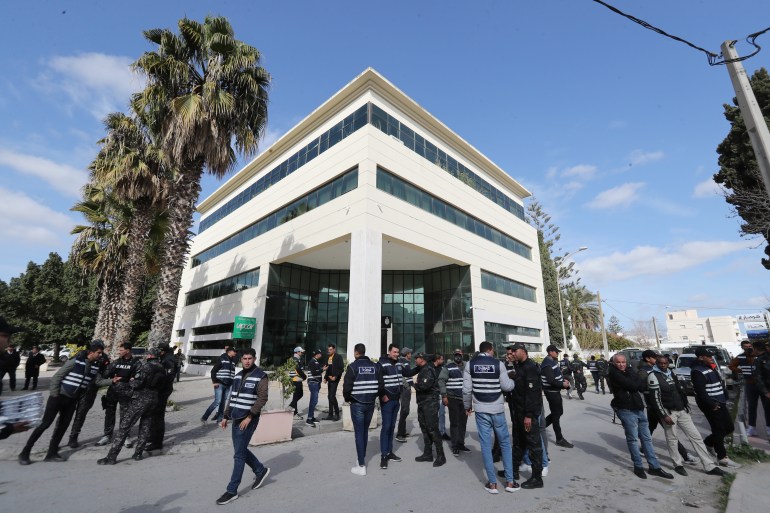The Tunisian "Ennahda" movement called on the Presidency of the Republic and the Ministries of Interior and Defense to "assume their legal responsibilities" in protecting the movement's supporters, its headquarters, and its head, Rached Ghannouchi, while condemnation and rejection of President Kais Saied's announcement of dissolving the Supreme Judicial Council continues.
The Ennahda movement's statement came yesterday, Friday, on the eve of a possible protest sit-in in front of Ghannouchi's house and another in front of its headquarters, which were called on Wednesday by "the Defense of Chokri Belaid and Mohamed Brahmi."
Ennahda said that it had sent correspondence to the Presidency of the Republic and the Ministries of Interior and Defense to hold them legally responsible for protecting its president, Rached Ghannouchi, his family, and supporters of the movement and its headquarters, after calls by the defense team of Chokri Belaid and Mohamed Brahmi to demonstrate in front of the movement's headquarters and Ghannouchi's house.
And she considered that "what was mentioned in the defense committee symposium is incitement against Ghannouchi and the movement's supporters," adding that "this speech threatens the safety of the movement's leader, his family, and all those in his home and party headquarters."
She stressed that "these threats and calls for violence and fighting are serious."
protest and accusation
On Wednesday, the defense committee of Belaid and Brahmi announced that "a protest sit-in will be held in front of Ghannouchi's house on Saturday, and another sit-in in front of the headquarters of the Ennahda movement."
The defense committee accused the head of Ennahda of "money laundering with his son", as well as possessing a "secret financial device", and accused him of "communicating with others in order to attack the country," she said.
Belaid was shot dead in front of his house on February 6, 2013, and his assassination sparked a political crisis in the country, making the situation even worse with a second assassination incident that killed the general coordinator of the popular (nationalist) movement, Mohamed Brahmi on July 25 of the same year.
Tunisia has been witnessing a severe political crisis since July 25, 2021, when President Kais Saied began imposing exceptional measures, including freezing the powers of Parliament, issuing legislation by presidential decrees, dismissing the government, and appointing new ones.
denial and condemnation
In a context related to the crisis in the country, reactions continued rejecting and condemning President Qais Saeed's announcement a few days ago to dissolve the Supreme Judicial Council by virtue of a presidential decree and to compensate it with another.
The various structures of the judicial authority rejected the President's decision, announcing that they had entered into a series of protest movements, and the announcement of the dissolution of the Supreme Judicial Council sparked widespread international concern and criticism, amid calls for Said to reverse his decision.
Mourad Messaoudi, head of the Tunisian Association of Young Judges, vowed to "continue the struggle" against Said's decision.
Al-Masoudi added, in a press conference in the capital, that reforming the judicial system can only be within a legal framework, not through decrees, and described President Saeed's position as an attempt to seize the judiciary, warning of the danger of the situation of the judiciary in the country.
In a related context, a number of prominent law professors and deans of law faculties expressed their refusal to dissolve the Supreme Judicial Council in light of the state of exception.
In a statement, they called on the President of the Republic to reverse his decision to dissolve the Supreme Judicial Council, stressing that the judiciary requires deep and comprehensive reform, given the weakness in its organization and functioning, and the deterioration and loss of confidence of litigants in it.
They also expressed their rejection of the President of the Republic going to carry out these reforms unilaterally by means of presidential decrees and orders, and by exceptional measures and in light of the state of exception.
For its part, the (non-governmental) Tunisian Judges Association called on the judges to a general meeting on Saturday, to deliberate on the exact situation of the judiciary in light of the exceptional measures and recent decisions of the President of the Republic and ways to address them, according to a statement.
The Supreme Council of the Judiciary is an independent constitutional body whose mission is to guarantee the independence of the (European) judiciary.
Questions and warnings
This comes at a time when the head of the council, Youssef Bouzacher, said, yesterday evening, Friday, that the political announcement to dissolve the Supreme Judicial Council is not a legal mechanism to change the council, considering himself as the head of the Supreme Judicial Council and this is his characteristic.
He continued, "Removing the institution that monitors the proper functioning of the judiciary, and the only body concerned with the mechanism for disciplinary action against judges, raises many questions, and we do not know the reason behind the dissolution of the Supreme Judicial Council now."
In this context, the Secretary-General of the Republican Party, Issam Chebbi, said in a statement to a local radio station, "We categorically reject Said's decision to dissolve the Supreme Judicial Council."
And he saw that what Saeed had done was a blow to the foundations of the civil state, the independence of the judiciary, and a last attempt to assemble the president with all the powers in his hand, so that he would become the ruler by his order in the country and abolish the arc of democracy and all its institutions, according to him.
The Supreme Judicial Council is an independent constitutional body whose tasks include ensuring the independence of the judiciary, holding judges accountable, and granting them professional promotions.

